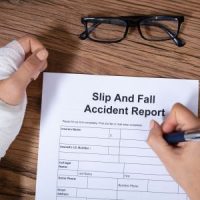What to Know About Florida Slip and Fall Accidents

Slip and fall accidents can happen just about anywhere and at any time and not always through the carelessness of the person who falls. In fact, many slip and fall accidents can be attributed to someone else’s negligence. It is critical for those who find themselves in this situation to have a thorough understanding of their legal options. Read on for a brief breakdown of the slip and fall laws in Florida.
Slip and Fall vs Trip and Fall Accidents
Slip and fall accidents, as their name suggests, occur when someone loses his or her footing, slides on a hazard, and falls backward. Someone who slipped on a spill in the grocery store, for instance, has experienced a slip and fall accident. Trip and fall accidents, on the other hand, occur when someone actually trips over an object and instead of falling backwards, is propelled forward. While slip and fall accidents often involve wet or frozen flooring, trip and fall accidents are more likely to be caused by things like uneven flooring, torn carpeting, or cables on the ground.
The injuries sustained in these kinds of accidents are also different. Slip and fall victims, for instance, are more likely to sustain injuries like shoulder dislocations, hip injuries, back injuries, and head trauma. Trip and fall victims, on the other hand, are more likely to suffer broken wrists and arms, cuts and abrasions, and neck injuries.
Where Do These Accidents Occur?
Both slip and fall and trip and fall accidents are more likely to occur in certain places, such as:
- Public pools, where the ground is likely to be wet and slippery, especially in changing rooms and restrooms;
- Sidewalks, parking lots, and garages, which may have sloping curbs, potholes, and crumbling asphalt;
- Grocery stores, which not only have hard and slick floors, but are more likely to have liquid spills;
- Bars and restaurants, which are often dark, making it harder for patrons to see and avoid spills or hazards;
- Gyms and locker rooms, where the floors are slippery and patrons must navigate unwieldy and heavy equipment;
- Parks, which may have tall grass, cracked walking paths, or fallen leaves and tree limbs; and
- Staircases, which can be dangerous when not well lit, or when uneven or lacking a railing.
Slip (or trip) and fall accidents that occur in these locations can often be linked to some form of property owner negligence.
Liability for Slip and Fall Accidents
In Florida, property owners who invite others on to their premises are required to take steps to make the property safe for visitors. This includes keeping their premises clean and free of debris, repairing hazards that could cause a slip and fall, like uneven flooring or missing staircases, and providing adequate lighting. Property owners that fail to fulfill this responsibility can be held liable for any resulting accidents and be required to compensate injured parties for their medical bills, lost wages, and pain and suffering.
Schedule a Free Consultation
Many slip and fall injuries result in significant costs for victims. Fortunately, injured parties can often recover these losses from the negligent parties who caused the injury in the first place. To learn more, please reach out to the dedicated Fort Lauderdale slip and fall lawyers at Boone & Davis by calling 954-566-9919 today.
Sources:
leg.state.fl.us/Statutes/index.cfm?App_mode=Display_Statute&URL=0700-0799/0768/Sections/0768.0755.html
forbes.com/advisor/legal/personal-injury/slip-and-fall-lawsuit/
